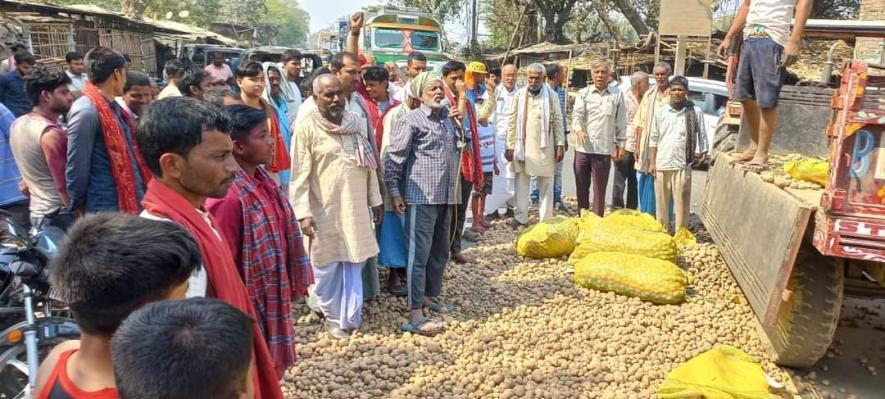Bengal Potato Farmers Livid as Mamata Govt Offers Meagre Price

Photo Farmers road blockade in BUrdwan district by felling potato in the state highway at Burdwan east district
Kolkata: Lakhs of potato farmers in West Bengal are angry and frustrated after the state government announced earlier this month that it will procure only 10 lakh tones through cold storages despite the agricultural marketing department expecting production of approximately 140lakh tonnes this year.
The government has offered a price of only Rs 6.50/kg as against the market price of Rs7-Rs 8 per kg to potato farmers for buying only7% of the produce despite having 15% storage facility at the state’s 450 cold storages, where itcan store 20-30 lakh tones. The price has crashed to Rs 420/50 kg sack, falling to Rs 5/kg in some districts, driving farmers to suicide.
“We demand the state government’s intervention to raise the potato price to the desired level. The government’s offer is less even than the amount that farmers are getting during distress sale,” All India Kisan Sabha (AIKS) state secretary Amal Haldar told Newsclick.
“The state government knows that farmers won’t part with their produce after incurring a loss of more than Rs 7,000 per bigha. We demanded that the government should purchase potato at minimum Rs10 per kg though the desired price was Rs12 per kg,” he further said.
The AIKS will “resume the protest to demand that the potato is procured atRs 10 per kg or more after the higher secondary examination are over”, he added.
Disenchanted with the Mamata Banerjee government’s attitude and demanding a fair price for their produce, potato farmers had blocked all the national highways passing through Bengal and more than 80 state highways on March 11.
Potato production has decreased this year with an average 60 sacks of potato produced from one bigha, according to farmers Tanmay Jana (Hooghly) or Bijon Ghosh (Jamalpur, Purbha Bardhaman), as most peasants were unable to cultivate the Punjab variety due to the lack of money.
If the government procures potatoes at current price, a farmer will get only Rs 18,000 from one bigha against the cost of production of Rs 29,000.
With the government not utilising the cold storages, which have a capacity of about 64 lakh metric tones, properly, potato price has crashed.
Bengal’ sagricultural market is volatile with potato farmers often forced to sell their produce at as low as Rs1or RS 2/kg, which is then dumped into cold storages by intermediaries who profit when the price rises. Thus, farmers sustain losses despite a good harvest.
Pradip Mazumdar, agriculture adviser to the Bengal government, told Newsclick that the “government will intervene, in case, of distress sale by potato farmers”.
Last year, he alleged that traders imported a lot of potatoes from Uttar Pradesh thinking they could earn extra profit if the price rose.
Ghosh, who had cultivated potato on seven bighas, termed the Trinamool Congress government’s announcement “tamasha”. “The Left Front government had stepped in twice by allotting Rs 400 crore and Rs 600 crore to purchase potatoes directly from the farmers,” he said.
Potatoes make their way into the market through three ways: a portion of the produce is stored by farmers, another portion by intermediaries and the remaining by cold storage owners, who buy them at Rs 300/50 kg during distress sale. The government price more or less matches the distress sale price.
Bengal is one of the largest potato-growing states with Hooghly—famous for its high-quality Chandramukhi variety—contributing more than 40% to annual production and the northern districts too producing huge quantities. Potato cultivation is the livelihood of more than one lakh farmers of Hooghly. After the ban on transportation of potatoes to other states, farmers are dependent on state markets to sell their produce.
Get the latest reports & analysis with people's perspective on Protests, movements & deep analytical videos, discussions of the current affairs in your Telegram app. Subscribe to NewsClick's Telegram channel & get Real-Time updates on stories, as they get published on our website.























